An article posted by Bernie Froese-Germain, Work-Life Balance and the Canadian Teaching Profession (2014), shared facts about the growing demands in the Canadian workforce and shift in how technology has compounded these expectations to a keep a work life balance.
If anything these demands have been further compounded by the COVID19 pandemic. The line between personal life and work are even more blurred and difficult to manage. Froese-Germain researches a series of recommendations to help alleviate the specific demands on a teacher, with four big take-aways as being 1) reduce class size, 2) increase support for students with special needs, 3) more time for planning, and 4) reduce administrative tasks.
In a discourse with emerging leaders, what I notice was managing time is a common theme as well. The sense to have more time is tied to autonomy because as a professional we need to decide how we are going to use it and manage it. It was a little puzzling that the article didn't recommend professional development and support in self efficacy. As many of the realities placed on a teacher are not easy to control, investing in more professional development to assist in managing a work life balance is essential. A timely article shared by Independent School Management, Teachers' Report: What They Want—and Don't Want—From Their School Leaders, support this. Principals who prioritize professional development, deemphasize teacher meetings, and more planning time in place of meetings, tend to perform better and be more satisfied.
Technology can play a big part in this too, we need to assist teachers with their work life balance by showing them how to separate their personal and work technologies. Some examples are:
- do not mix personal and professional correspondence with the same email,
- send drafted emails during work hours,
- use different (separate) web browsers for work and personal use,
- store personal files separately from your work storage,
- if you use personal social media for work create separate accounts approved by your employer,
- keep your personal email and social media private, etc.,
- remove work notifications from any personal device.

Comments
Post a Comment